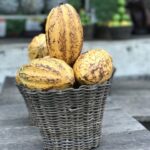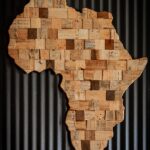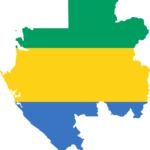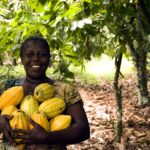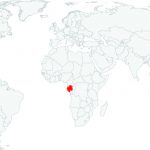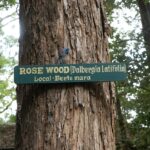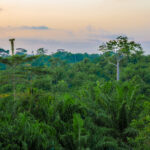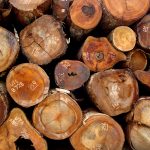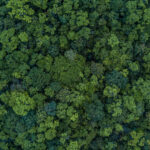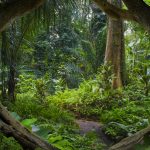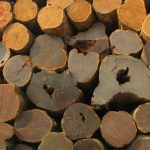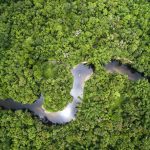
- Despite a strong legislative framework for forest management, illegal logging is still considered widespread in Gabon.
Governance reforms are underway with political commitment to achieve certification for all forest concessions by 2022. - NGOs continue to document sector-wide illegalities, widespread corruption, and illegal timber being sold on international markets.
- There is currently no mandated independent forest monitor; therefore, information on company compliance with national legislation is limited.
- Over the last fifteen years, there has been a substitution of European trading partners by Asian – mainly Chinese operators – and Gabon is now the one of the most important destinations for Chinese forestry sector investment in Africa.
- Despite a rise in trade with Asia, Gabon still exports high risk timber to Europe and the U.S. and there is a risk that timber sourced from Gabon is used in Chinese, Vietnamese and Indian-manufactured products that are likely entering European and U.S. markets.
Read more by downloading the Gabon Timber Legality Risk Dashboard here.
A new study has found that all kinds of agriculture can contribute to deforestation to some extent, but the impact from the marginally-higher income gained from cocoa production-based livelihood portfolios was particularly significant, being “associated with six to seven times higher deforestation compared to other livelihood strategies.”
The results suggest that if development leads to households switching their focus from small-scale agriculture to internationally-traded commodities such as cocoa, “this may result in a significant increase in deforestation,” said the authors. Households that consume a lot of what they produce are less likely to deforest the landscape than those that funnel their production towards markets. Yet, “when households have better access to markets, they tend to decrease their share of auto-consumption, which can also have a tendency to increase deforestation.
Study can be found here: Cocoa, livelihoods, and deforestation within the Tridom landscape in the Congo Basin: A spatial analysis – CIFOR-ICRAF Knowledge
This short article summarizes some examples from Africa illegal logging has supported organized crime and corrupt officials (or their families).
Mills in Gabon’s Nkok SEZ account for more than 40% of the country’s export productions.
The government in Gabon plans to launch a timber exchange to establish a platform for exchanges between stakeholders and ensure the traceability. This project also aims to create opportunities for small operators by facilitating their access to markets.
Using a unique dataset from a survey of 1035 households in the Tridom landscape in the Congo basin, the reports model shows that: (1) Households imitate the deforestation decisions of their neighbors; (2) A marginally higher income from cocoa production-based livelihood portfolios is associated with six to seven times higher deforestation compared to other livelihood strategies with a significant spillover effect on neighboring households’ deforestation. The increase in income, mainly from cocoa production-based livelihoods in open-access systems can have a negative effect on forests. Households with a higher share of auto-consumption are associated with lower deforestation. If economic development brings better market access and lower auto-consumption shares, this is likely to positively influence deforestation. Without proper land use planning/zoning associated with incentives, promoting sustainable agriculture, such as complex cocoa agroforestry systems, may lead to forest degradation and deforestation.
A team led by Tanzanian remote-sensing scientist Robert Masolele used high-resolution satellite data and deep-learning techniques to draw up a map identifying the drivers of forest conversion in Africa.
The research shows that most deforested land on the continent is turned into small-scale farms, with the Democratic Republic of Congo and Madagascar being hotspots for this pattern of forest loss.
With better remote-sensing data, researchers can pinpoint where agriculture is eating into forested areas and where cash crops are replacing woodland. In this work, the group focused on commodity crops like cacao, oil palm, rubber and coffee, which are targeted under the European Union’s recently enacted rules to restrict import of crops linked to deforestation.
According to the ITTO MIS May 1, 2024, stringent sustainability practices demanded in Gabon As things stand at present in 2025 all forestry operations in Gabon will have to secure FSC certification, a move towards more stringent sustainability practices. This legislative push has been reinforced by the Forestry law mandating full payment of land taxes. The firm stance taken by the government underscores the commitment to enforcing environmental standards.
The ITTO MIS reports that March 25th marked the deadline for operators in Gabon to pay their land taxes at the current rates. The rates vary based on the certification status of companies. Those with FSC or OLB certification (Origine et Légalité des Bois) incur a fee of 300 CFA per hectare those with only legal agreements are charged 600 CFA per hectare with others facing charges of 1000 CFA per hectare. It is reported that some operators have opted for instalments until year-end to manage their cash flow.
Observers in Gabon report the forestry sector is facing a significant setback after suspension of their ‘Plan d’Amenagement des Operations’ (PAO). This suspension affected numerous companies whose operations were stalled due to the expiration of their PAO validity. In response to this suspension operators sought an extension to their PAO up until the end of the year and agreement was reached with some operators. Operators that did not receive extensions had to cease operations and this led to worker lay-offs.
This report by Global Witness shows how the 20 biggest banks in the EU have provided billions to companies linked to deforestation since 2016. This review shows that voluntary guidelines and individual commitments by financial institutions are unlikely to stop the financing of forest destruction.
The UN has decried illegal trade in wildlife and forest products in Nigeria with little effective prosecution. The 2023 UNODC Organized Crime Threat Assessment for Nigeria revealed that Nigeria is a key transit hub and consolidation point for various forms of illegal trade in wildlife and forest products (including rosewood). These products are sourced both from Nigeria as well as other countries in the region including Cameroon, Gabon, the Central African Republic, the Democratic Republic of Congo, Liberia, Cote d’Ivoire and Benin Republic.
Other related news cites more than 1000 records between 2011 and 2020 indicating that Nigeria is a source, transit, or destination country, or that the offender was a Nigerian national. Nigeria deals on illegal wildlife, forest products – Blueprint Newspapers Limited
The first high-resolution (5 m) and continental-scale
mapping of land use following deforestation in Africa, including humid and dry forests.
Results show, not surprisingly, that the causes of forest loss vary by region. In general, small-scale cropland is the
dominant driver of forest loss in Africa, with hotspots in Madagascar and DRC. In addition, commodity
crops such as cacao, oil palm, and rubber are the dominant drivers of forest loss in the humid forests of
western and central Africa, forming an “arc of commodity crops” in that region. At the same time, the
hotspots for cashew are found to increasingly dominate in the dry forests of both western and southeastern Africa, while larger hotspots for large-scale croplands were found in Nigeria and Zambia.
The 2024 Finance Bill plans changes for the forestry and timber industry: in particular, it envisages a consolidation of taxation for certified operators and an increase in taxation for non-certified operators. To illustrate, the various rates of area tax would be increased to :
300 FCFA per hectare for concessions with FSC or PEFC/PAFC sustainable management certification
600 FCFA per hectare for legally certified concessions
1,000 FCFA per hectare for non-certified concessions.
Ali Bongo Ondimba, the president of Gabon, known for his visionary approach to climate change, was blindsided by a military coup this week.
As the fate of Ali Bongo hangs in the balance, there are concerns about what will happen to Gabon’s pristine forests and marine protection. Foreign conservationists worry that a power vacuum could result in increased poaching, illegal logging, and deforestation. Gabon recently negotiated a debt refinancing deal that freed up funds for marine protection, but these gains could be lost with the political instability.
The tropical forests of the Congo Basin are home to nearly 1 million indigenous people. After thousands of years of survival, deforestation is perhaps their biggest challenge yet. On International Day of the World’s Indigenous Peoples, FRANCE 24 takes a closer look at what’s being done to help.
Timber processed in the country’s Nkok Special Investment Zone (SIZ) is required to be harvested in line with European Union certifications for sustainability.
However, TraCer, the monitoring system meant to ensure the traceability of wood entering the Nkok SIZ, was recently suspended by Gabon’s Ministry of Water and Forests.
While TraCer was quickly reinstated, its suspension points to issues surrounding forest management and the Gabonese timber industry, including trafficking scandals involving the Ministry of Water and Forests.
CSM Tech, an Indian IT software design company, recently signed a contract with Gabon’s Ministry of Economy and Recovery for the establishment of a timber traceability solution and an electronic timber trading platform.
The local media comments that this new tracking system will open finished wood products from Gabon to the world market. Questions have been raised on how a new tracking system will fit with the existing system used in the special economic zone (SEZ) of Nkok which traders find is recognised by the authorities in the EU
Also mentioned in ITTO Newsletter, May 16 2023
The project aims at digital transformation of existing forest and business operations, ensuring sustainable forest management through digitalisation and end-to-end tracking of all administrative and technical activities.It will bring transparency in transactions, rooting out illegal timber harvest and ensuring environmental sustainability by cutting greenhouse emissions.
Loggers are closely monitored by satellite and a tracking system that allows the origin of each log to be traced. The Gabonese government said in 2018 that companies would have to comply with international Forest Stewardship Council standards for logging by 2022. That date has been pushed back to 2025, and the battle is not yet won: of 65 wood-processing companies, only 15 have been certified.
Drawing from Center fro Africa Strategic Stiudies recent report, which is based on recent research and programmatic work at the Africa Center for Strategic Studies, we have analyzed three ways that illegal logging affects national security and what that means for current measures to counter it.
ATIBT relays here a press release written by Brainforest and FRM Gabon.
This overview report assesses the region’s progress in developing timber traceability systems to reduce additional pressures from over-exploitation due to corruption, insufficient accountability, and illegal logging. It examples how Tanzania’s established timber traceability system may offer valuable lessons to guide Congo Basin countries in a stepwise process to overcome complex models, gain political buy-in and secure government ownership.
ATIBT, an African trade association representing the private tropical forest sector, and which promotes the sustainable, ethical and legal tradeof tropical timber as a natural and renewable resource, has shared the communiqué of the design office FRM Gabon and the organization Brainforest following the notification of suspension of activity of the service TRACER in Gabon.
Officials say most member states in the Central African Economic and Monetary Community, CEMAC, have failed to honor a ban on raw timber exports that was enacted last year to conserve forests and create jobs by locally processing wood.
The six member countries of the Central African bloc agreed to ban raw timber exports starting in January 2022. The ban is aimed partially at combating climate change by protecting forests from excessive logging.
However, an online meeting of CEMAC forestry and finance ministers Thursday found that only Gabon and the Republic of Congo have suspended the timber exports to China and other Asian countries. Cameroon, the Central African Republic, Chad and Equatorial Guinea have not.
The deadline for implementing the ban was initially pushed back to January 2023 to give the CEMAC countries more time to comply. Motaze suggested the bloc push back the deadline again to 2025 so countries have more time to invest in wood processing equipment and in training workers.
In Central Africa, the ban on the export of logs will no longer take effect from 1 January 2022. The entry into force of this measure has been postponed to an unspecified date. This was the outcome of the 38th ordinary session of the Council of Ministers of the Economic Union of Central Africa (UEAC), which ended on 28 October 2022 in Yaoundé, Cameroon.
This is a retropalent for the countries of the Economic Union of Central Africa (UEAC). The entry into force of the ban on timber exports in the form of logs, which was set for 1 January 2023, has been postponed to a date yet to be determined.
Many of the countries that form part of the rainforest like Cameroon and the Democratic Republic of the Congo struggle with conservation due to a lack of funds or rebel groups.
Gabon, on the other hand, claims it has preserved its natural environment with satellite imagery and environment-first policies – and some industry insiders agree.
“Between 2010 and 2020, Gabon only lost approximately 12,000 hectares (29,652 acres) of forest which is less than 0.1 percent per year,” said George Akwah Neba, the coordinator of the Congo Basin Programme at the Forest Stewardship Council (FSC).
“We’ve seen a huge regeneration of degraded forests since the early 2000s with several courageous decisions that set Gabon apart as a leader in environmental and forest management policies”.
Illegal logging is a growing feature of transnational organized crime in Africa, often facilitated by the collusion of senior officials, with far-reaching security and environmental implications for the countries affected.
In view of the entry into force, from January 1 2023, of the measure prohibiting the export of logs in the six CEMAC countries (Cameroon, Congo, Gabon, Chad, CAR and Equatorial Guinea), a workshop devoted to the validation of the regional guidelines for taxation and forest certification is currently being held in Libreville.
Gabon’s environment minister has announced an immediate end to the logging of the Massaha ancestral forest in the country’s northeast, setting his administration a two-month deadline to finalize technical questions for permanent protection of the site. The move follows his visit to Massaha to gain a better understanding of the motives behind the community’s request to declassify the logging concession and grant it protected area status. Minister Lee White also ordered the Chinese company that holds the logging concession, Transport Bois Négoce International (TBNI), to “leave quickly” and “preserve the area.”
According to an article in Le Nouveau Gabon, wood production has doubled in the last 10 years to reach 3.7 million m3 in 2021.
Deforestation due to the illegal cutting and sale of wood could be a sad memory in Central Africa. One of the countries of the sub-region wants to take up this challenge. Gabon is developing a system to monitor the legality and traceability of the timber it exports. Launched in July 2021, the Legality and Traceability Control System (LTCS) has as its main objective the preservation of forests and the improvement of transparency in the timber sector.
With its oil reserves waning, Gabon is betting that careful logging can safeguard the vast wealth of its forests, halving its associated carbon emissions while producing more timber. How Central African countries like Gabon manage their share of the world’s second-largest rainforest is critical. The so-called lungs of Africa store more carbon per hectare than the Amazon, help regulate temperatures, and generate rain for millions in the arid Sahel and distant Ethiopian highlands.
Click here to access the Global Illegal Logging and Associated Trade (ILAT) Risk assessment tool and to download the Forest Trends User Guide describing the functionality of the ILAT Risk Data Tool.
Click here to access the Cattle Data Tool.

